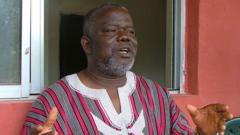In Liberia’s capital, Monrovia, Prince Yormie Johnson, a former warlord turned senator, has died at the age of 72. His legacy is marked by a duality of praise and condemnation stemming from his tumultuous past. Johnson became infamous for a 1990 video showing him sipping a beer as a captured President Samuel Doe was tortured and killed by his soldiers. As a central figure throughout Liberia's civil wars from 1989 to 2003, he has long been criticized for his role in the violence that led to the deaths of an estimated 250,000 individuals.
While Johnson has held a senator position since 2005 and was influential in shaping the political landscape by supporting multiple successful presidential candidates, his tenure has been shadowed by unresolved war crime allegations. The Truth and Reconciliation Commission had recommended that he be prosecuted for his actions during the conflict, but legal repercussions never materialized. In this light, human rights activist Adama Dempster stated that many victims who long sought his accountability see his death as a profound loss.
The nature of Johnson's death remains unspecified, but President Joseph Boakai, whom Johnson supported in the last election, acknowledged his significant impact on Liberia's political discourse. Despite his controversial history, Johnson was viewed by many in Nimba County as a hero who championed local development. His detractors, however, have pointed to significant issues such as alleged corruption, like in 2021 when the U.S. sanctioned him for being involved in unethical financial practices regarding government funds.
Though Johnson claimed to have transformed his life and become a pastor, his political career was marred by accusations of vote buying and exploitation of power, further complicating his legacy. With Johnson's death, a divided narrative persists—while some mourn the passing of a local icon, others lament the absence of justice for past horrific acts committed during Liberia's civil wars. This dichotomy encapsulates Liberia's ongoing struggle with reconciling its violent past and seeking accountability for human rights violations.
While Johnson has held a senator position since 2005 and was influential in shaping the political landscape by supporting multiple successful presidential candidates, his tenure has been shadowed by unresolved war crime allegations. The Truth and Reconciliation Commission had recommended that he be prosecuted for his actions during the conflict, but legal repercussions never materialized. In this light, human rights activist Adama Dempster stated that many victims who long sought his accountability see his death as a profound loss.
The nature of Johnson's death remains unspecified, but President Joseph Boakai, whom Johnson supported in the last election, acknowledged his significant impact on Liberia's political discourse. Despite his controversial history, Johnson was viewed by many in Nimba County as a hero who championed local development. His detractors, however, have pointed to significant issues such as alleged corruption, like in 2021 when the U.S. sanctioned him for being involved in unethical financial practices regarding government funds.
Though Johnson claimed to have transformed his life and become a pastor, his political career was marred by accusations of vote buying and exploitation of power, further complicating his legacy. With Johnson's death, a divided narrative persists—while some mourn the passing of a local icon, others lament the absence of justice for past horrific acts committed during Liberia's civil wars. This dichotomy encapsulates Liberia's ongoing struggle with reconciling its violent past and seeking accountability for human rights violations.




















